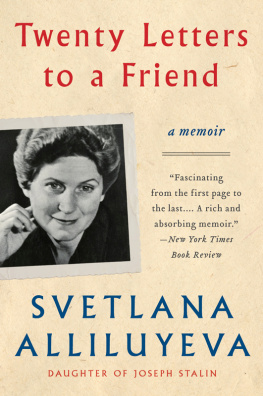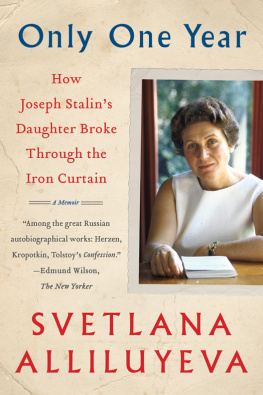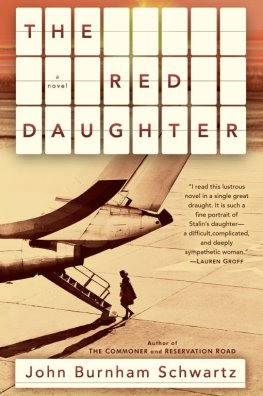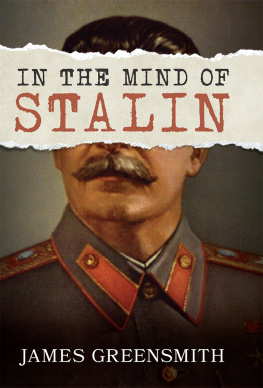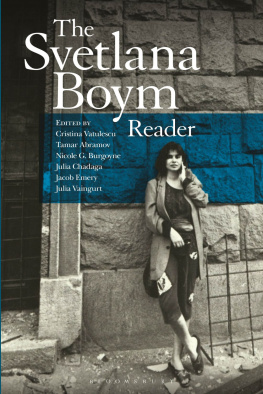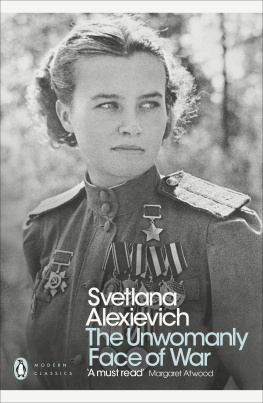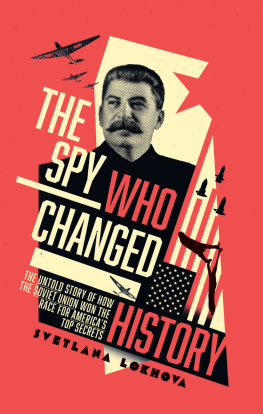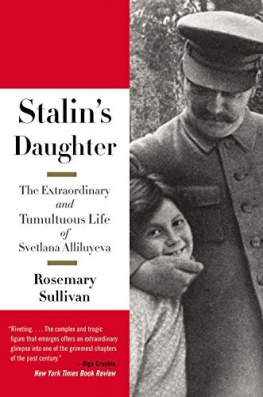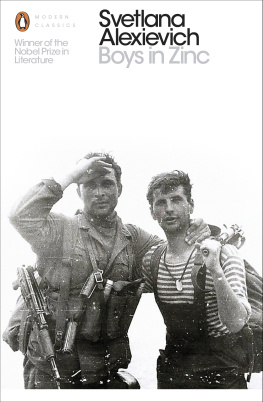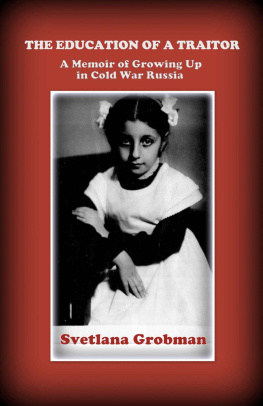Introduction, pages 14
GUM: The State Universal Store, largest department store in Moscow, located on Red Square.
Yaroslavna: Wife of Prince Igor in the Russian tale Song of the Host of Igor. When Prince Igor is taken captive, Yaroslavna is left weeping like a cuckoo on the fortress wall.
The people are silent: At the end of Pushkins tragic Boris Godunov, the people are called on to proclaim the Pretender Dmitri as Czar. According to Pushkins final stage instruction for the play, The people are silent.
Letter 1, pages 515
Georgy Maximilianovich Malenkov, 1902: Member of Communist Party Central Committee from 1939 and member of Stalins Politburo from 1946. He assumed the post of Secretary of the Central Committee on Stalins death but resigned a few days later, March 14, 1953. Chairman of U.S.S.R. Council of Ministers March 6, 1953February 9, 1955. Ousted from Central Committee as member of anti-Party group in June, 1957.
Nikita Sergeyevich Khrushchev, 1894: First Secretary of the Communist Party Central Committee 195364 and Chairman of U.S.S.R. Council of Ministers 195864.
Nikolai Alexandrovich Bulganin, 1895: U.S.S.R. Minister of Defense 194749, 195355. Chairman of U.S.S.R. Council of Ministers from 1955 to 1958, when his association with the so-called anti-Party group was made known.
Lavrenty Pavlovich Beria, 18991953: Held important posts in Cheka and GPU organs in Transcaucasia 192131 and was First Secretary of Transcaucasian committee of Communist Party 193238. Commissar of Internal Affairs 193845 and Deputy Prime Minister in charge of security 194153. Arrested in June and shot as an imperialist agent in December, 1953.
Vladimir Nikitich Vinogradov, 18821964: One of nine Kremlin doctors arrested in November, 1952, on charges of conspiring with British and American intelligence services to murder Soviet leaders. They were said to have killed Andrei Zhdanov in 1948. On April 4, 1953, it was announced that the nine accused doctors, plus six others whose arrest had not previously been made public, were released and that the accusation against them had been without legal foundation.
Vasily Khrustalyov: Head of Stalins personal bodyguard.
Hall of Columns: A hall in the House of Unions Building, where prominent Soviet personalities lie in state.
Kliment Yefremovich Voroshilov, 1881: Member of Communist Party Central Committee from 1921 and of Politburo from 1926. Appointed Commissar of War and the Navy in 1925; relieved as Commissar of Defense in 1940. Chairman of Presidium of U.S.S.R. Supreme Soviet (titular head of state) 195360.
Lazar Moiseyevich Kaganovich, 1893: Member of Communist Party Central Committee from 1924 and of Politburo from 1930. Peoples Commissar of Transport 193544. Deputy Chairman and then First Deputy Chairman U.S.S.R. Council of Ministers 194757. Dismissed from office and from Central Committee in June, 1957, as member of anti-Party group.
Anastas Ivanovich Mikoyan, 1895: Member of Communist Party Central Committee from 1923 and of Politburo from 1935. In charge of foreign and domestic trade from 1926 and of food industries from 1930. Held posts of Deputy Prime Minister and First Deputy Prime Minister during Khrushchev era. Resigned as Chairman of Presidium of Supreme Soviet (titular head of state) in December, 1965.
Yury Levitan: Well-known Soviet news broadcaster.
Letter 2, pages 1626
Cheka: Abbreviation for the Extraordinary Commission for the Struggle Against Counterrevolution and Sabotage, set up in December, 1917, and later known successively as the GPU, OGPU, NKVD, MVD, MGB, and currently KGB, or State Security Committee. The function of each of these organizations has been maintenance of internal security. Members of the Cheka were known as Chekists.
Mingrelian uprising: Mingrelia is the historical name of the area in western Georgia north of the Rioni River adjacent to the Black Sea which is inhabited by Mingrelians. In 1952 an alleged Mingrelian nationalist organization which included leading local Communist Party officials was liquidated.
Ilya Yefimovich Repin, 18441929: Russian realist painter.
The sort of warehouse: The property of victims of arrest was confiscated and kept in warehouses until a decision was made as to its disposal.
Leninskiye Gorki: Lenins country residence outside Moscow, where he died.
Twentieth Party Congress: The Twentieth Congress of the Soviet Communist Party of February, 1956, at which Khrushchev delivered the secret speech denouncing Stalin.
Letter 3, pages 2738
Boris Mikhailovich Shaposhnikov, 18821945: Marshal of the Soviet Union. Chief of Staff of Red Army and Deputy Peoples Commissar of Defense in 1930s. Chief of Staff again in 194142; appointed head of Voroshilov Military Academy 1943.
Ivan Andreyevich Krylov, 17691844: Russian writer and fabulist.
Nikolai Ivanovich Bukharin, 18881938: A leading Communist Party theoretician. During the 1920s supported Stalin against Trotsky and later against Zinoviev and Kamenev. He favored continuation of the New Economic Policy, however, and in 192829 he was, together with Rykov and Tomsky, leader of the so-called Right Opposition to Stalin. In spite of this he remained a member of the Central Committee until 1936 and took an active part in drawing up the 1936 Constitution. In March, 1937, he was accused of being a Trotskyite and expelled from the Party. In March, 1938, in the last great show trial of the purges, he was found guilty of treason and executed.
Grigory Konstantinovich Ordzhonikidze, 18861936: Became a Bolshevik in 1903 and was active in Georgian revolutionary movement. Directed the Communist Party in the Caucasus in 1920 and in Transcaucasia 192126. Became Politburo member and Chairman of Supreme Council of National Economy in 1930 and Commissar of Heavy Industry in 1932. Sided with Stalin against Trotsky during 1920s but is thought to have tried to limit scope of purges. His death was discussed by Khrushchev at Twentieth Party Congress in 1956.
Semyon Mikhailovich Budyonny, 1883: Commander of First Cavalry Army during Russian Civil War and Marshal of Soviet Union from 1935.
Sochi: Soviet resort on Black Sea coast of Abkhazia, in the Caucasus.
Abel Sofronovich Yenukidze, 18771937: Joined revolutionary movement in the Caucasus in 1890s and became member of Communist Party Central Committee after the Revolution. Disappeared during purges of 1930s.
Vyacheslav Mikhailovich Molotov, 1890: Commissar (later Minister) of Foreign Affairs 193949 and 195356. Dismissed in 1957 as member of Central Committee and First Deputy Prime Minister as member of anti-Party group.
Gorodki: A game resembling skittles.
Felix Edmundovich Dzerzhinsky, 18771926: A Soviet leader of Polish origin, elected to Bolshevik Central Committee in August, 1917, who took active part in preparation of October Revolution. Nominated by Lenin in December, 1917, to be first head of Cheka (from 1922 known as OGPU) and held this post until his death in 1926.
Letter 4, pages 3953
Tiflis: Prerevolutionary name for Tbilisi, now capital of Soviet republic of Georgia.
Mikhail Ivanovich Kalinin, 18751946: Titular head of Soviet state from March, 1919, until his death in 1946. A popular figure who was said frequently to help in hardship cases and was known as Papa Kalinin.
Ivan Timofeyevich Fioletov, 18441918: Member of Communist Party from 1900 and early participant in revolutionary movement. Shot by the British in Baku in September, 1918.
Shatura: A power station between Moscow and Leningrad, construction of which was one of the major electrification projects of the 1920s.
Zinovy Yakovlevich Litvin-Sedoi, 18761947: Communist Party member from 1897. A leader of December, 1905, uprising in Moscow and participant in Russian Civil War.
War Communism: The name by which the social and economic policy of the Soviet Government from 1918 to 1921 is known. A period of nationalization of industry and trade, wages in kind for workers and employees, compulsory food delivery by peasants and obligatory labor service by the middle classes. A rigorous period ended by the so-called strategic retreat of the New Economic Policy.
Next page
